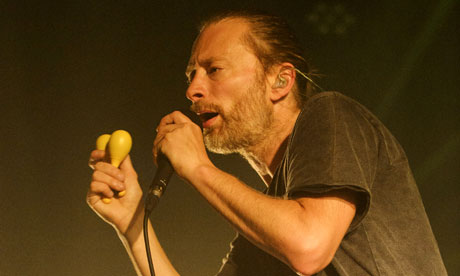
Radiohead frontman Thom Yorke has pulled his solo songs and those with his group Atoms For Peace from music streaming service Spotify, complaining that "new artists get paid fuck all with this model".
Yorke and producer Nigel Godrich took to Twitter to express their annoyance at the business model for new artists, and explain their reasoning.
"The numbers don't even add up for Spotify yet. But it's not about that. It's about establishing the model which will be extremely valuable," Godrich, whose production credits include albums for Radiohead and Paul McCartney, tweeted. "Meanwhile small labels and new artists can't even keep their lights on. It's just not right."
He continued: "Streaming suits [back] catalogue. But [it] cannot work as a way of supporting new artists' work. Spotify and the like either have to address that fact and change the model for new releases or else all new music producers should be bold and vote with their feet. [Streaming services] have no power without new music."
Spotify offers a limited free streaming service, and an unlimited service at tiers of £5 and £10 a month. But some artists have complained that it is less effective for them to make music available there than to sells CDs and digital downloads because the per-stream payments are comparatively tiny.
The industry average offers slightly less than 0.4p a stream - meaning that 1m streams of a song would generate about £3,800. Most songs receive far fewer streams.
The row highlights the collision between new models of listening to music created by streaming as the industry tries to find methods of dissuading fans from using illicit services to download songs for free without repaying artists.
Godrich insisted that the point was not about gaining more money for himself or Yorke, whose work with Radiohead sold millions of CDs in the past two decades. "The music industry is being taken over by the back door. And if we don't try and make it fair for new music producers and artists, then the art will suffer. Make no mistake. These are all the same old industry bods trying to get a stranglehold on the delivery system."
Yorke pitched in to the debate. "Make no mistake, new artists you discover on Spotify will not get paid. Meanwhile shareholders will shortly be rolling in it. Simples," he tweeted, and added as a riposte to critics that the suggestion his move was pointless missed its purpose: "'Your small meaningless rebellion is only hurting your fans ... a drop in the bucket really.' No, we're standing up for our fellow musicians."
Spotify has been having notable success getting some established bands to make their music available on its service: Daft Punk's Get Lucky rapidly became one of the most-streamed songs ever.
Last month, Pink Floyd made its back catalogue available on Spotify after fans streamed the song Wish You Were Here more than 1m times.
But Godrich said: "Making new recorded music needs funding. Some records can be made in a laptop, but some need musician[s] and skilled technicians. Pink Floyd's catalogue has already generated billions of dollars for someone (not necessarily the band) so now putting it on a streaming site makes total sense. But if people had been listening to Spotify instead of buying records in 1973 I doubt very much if Dark Side [of the Moon, Pink Floyd's record-breaking album released that year which sold hundreds of millions of copies] would have been made. It would just be too expensive."
The move has won support on Twitter from a number of artists, including Four Tet's Kieran Hebden, who tweeted: "I had everything on my label taken off [Spotify]. Don't want to be part of this crap." He added "I don't get why [it's] such a big deal to not do Spotify. My music [is] easy to get elsewhere. I'm just not into it."
Tracks from the Beatles and rockers AC/DC are not available on Spotify.
Other big names from the past such as Led Zeppelin and King Crimson have refused to put their music on streaming services. King Crimson frontman Robert Fripp has been a vocal critic of the amounts that artists signed to labels are paid for their music - and has not acceded to putting any music on them, nor on services such as iTunes.
0 comments Blogger 0 Facebook
Post a Comment